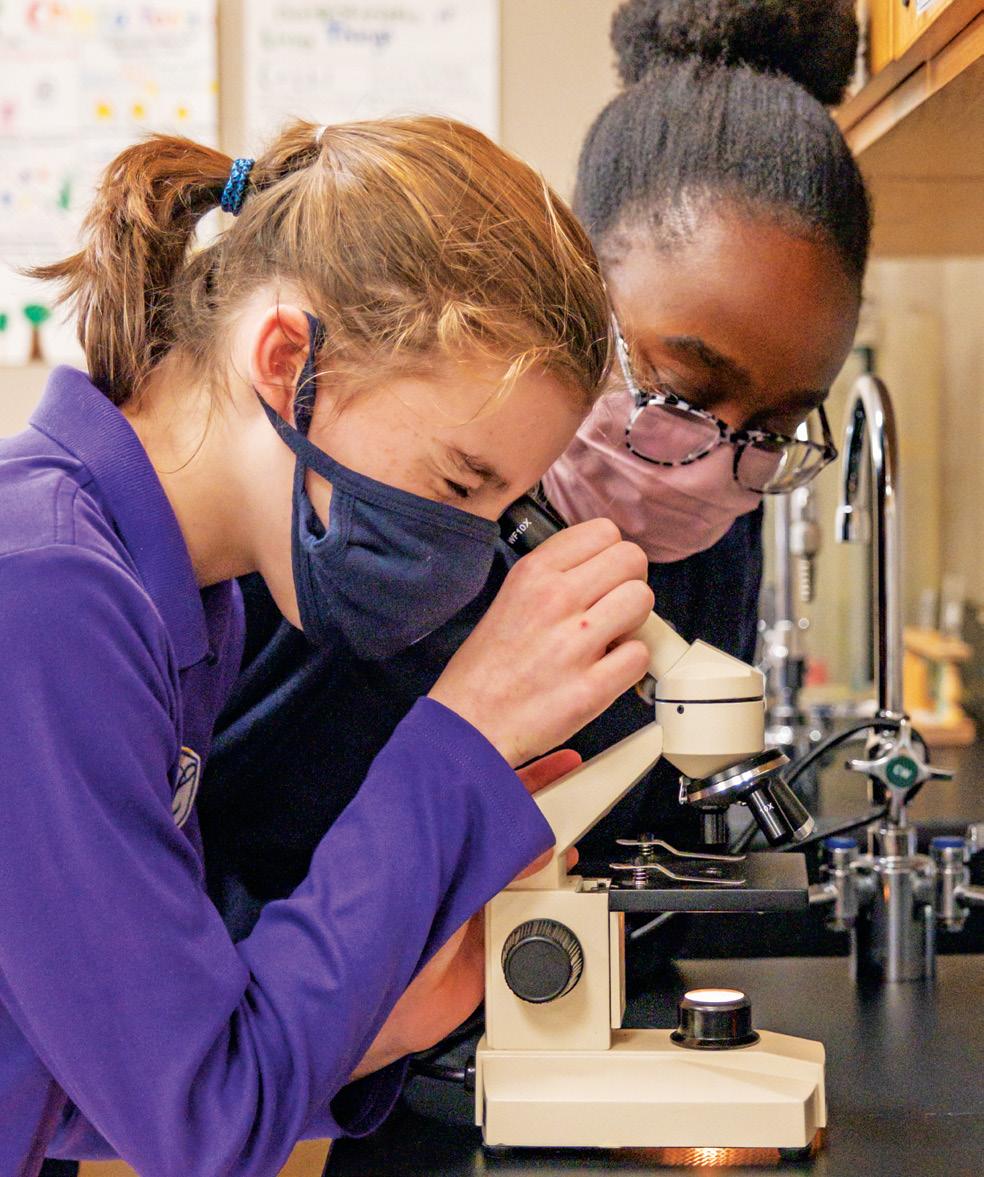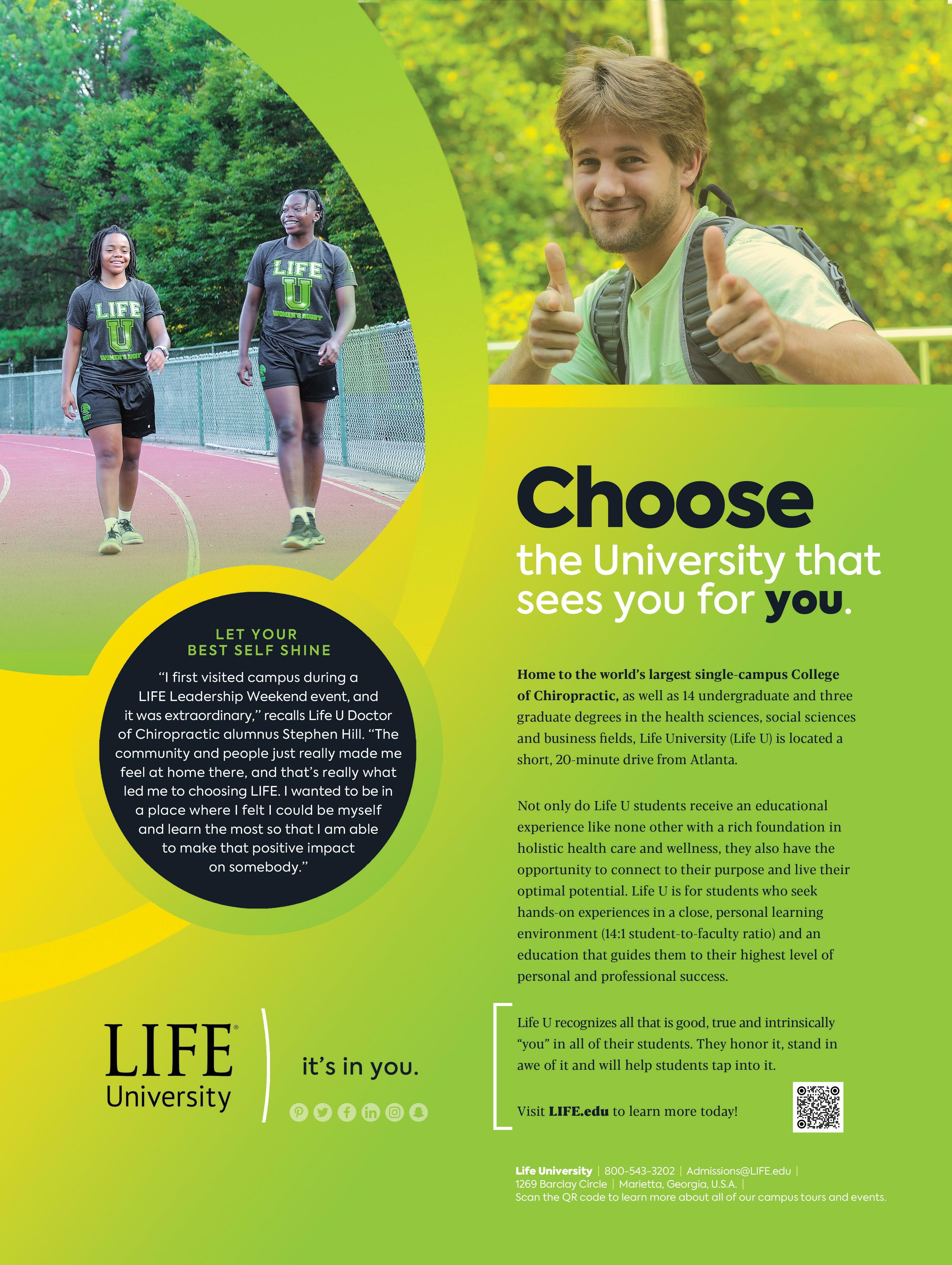
14 minute read
Private Schools in Metro Atlanta
Atlanta Academy
Private Schools in Metro Atlanta: A Primer for Relocating Families
By Alexandra McCray
The process of relocating comes with a bevy of important tasks, and finding the right school for your child is surely at the top of the list. If you are interested in sending your children to one of the metro area’s independent schools, this primer will help you begin to get acquainted with the metro Atlanta private school market and shares some essential details to consider as you begin exploring the options.
Timing is Everything
The first step you’ll likely want to take is determining your timeline for researching and applying. According to Rebekka Whitehead, founder and CEO of Whitehead Learning Group, an education consultant company that supports families through the process of finding and applying to private schools in metro Atlanta, “We partner with families June to June—a full year—to ensure that parents are getting an appropriate feel of the private school landscape, navigating their non-negotiables when it comes to identifying their child’s next school home and finalizing their school list.” She suggests, if possible, that parents relocating to Atlanta also start looking at schools about a year out from the summer leading into their children entering a grade at the new private school.
In addition to your move date, application deadlines can also affect your research and preparation timeline. Whitehead says it’s common for schools to open applications for the following school year from the start of October to early or mid-December and require outside documentation and other processes such as interviews to be submitted and completed by February. “Notifications are always sent out the first Saturday in April,” she says.
Not all private schools in metro Atlanta follow this admission schedule, and some offer rolling admissions. More than 70 schools in the region are members of the Atlanta Area Association of Independent Schools (AAAIS). According to the organization’s Principles of Best Practice, schools that are members follow set common admission calendar dates. After admission notification at the end of March or

Mount Paran Christian School
the start of April for general purpose schools (not focused on special needs), parents have about a two-week period to contemplate their final decision, and member schools do not reach out to them during this time. There are situations that allow AAAIS schools flexibility outside the set common admission calendar dates, including if a family is relocating from out of the country.
Lyndon Academy

Bracing for Competition
High competition is a reality of the metro Atlanta private school market. “Atlanta is a unique learning microcosm because our city offers schools that cater to grades K-5, K-6, K-8, 6-12, 7-12 and K-12,” Whitehead says. “There are ‘feeder schools’ and general placement trends that contribute to high application


numbers and low attrition values.” She explains that, as expected, application rates and openings are higher for the grades schools consider to be “traditional entry points” for new stages, such as the beginning of upper school, which may combine what is usually thought of as middle and high school. “The ‘nontraditional entry points’ are those years in between—1st, 2nd, 3rd—and while there are historically less applicants, there are also [fewer] spots,” she says.
Because private school acceptances can be hard to come by, Whitehead says there are two strategies parents sometimes adopt. One, she explains, is that they’ll go the public education route for elementary school and apply to private schools for middle school. Whitehead explains that parents like to use the time before middle school in different ways, but mainly to help their children discover what they’re passionate about. “We’ve seen a myriad of things. Overall, it’s about students being exposed to different interests—sports, extracurriculars, academic—before learning what to specialize in for middle school. This strategy also helps with the interview process and student personal statement,” she says.
The other plan involves parents working to get their children accepted to the private school of their choice from kindergarten.
Pre-K through 12th Grade

AVERAGE ACT SCORE: 30 AVERAGE SAT SCORE: 1352 AVERAGE PSAT PERCENTILE AMONG JUNIORS: 94th
*Results among students with 5 years or more of education at Lyndon
LyndonAcademy.org 770-926-0166
Atlanta International School
Considering Finances and Location
Whitehead says that parents may also decide to pursue the first option as part of a financial strategy to offset the cost of a private school education. Based on data from schools her firm works with, tuition costs for kindergarten through middle school can range from slightly under $10,000 and go as high as more than $32,000, while high school can start at $13,500 and also go to over $32,000. Families’ religious affiliation and the number of children attending the school also can affect tuition pricing. School location can be as important a factor when considering a private education as it can be if you were enrolling your child in public school. Of the four most populous counties in the metro area, the biggest, Fulton, also has more private school options than its smaller counterparts, according to data from the Georgia Department of Education and the 2020 Census. Fulton, which includes popular cities such as Atlanta, Alpharetta and Johns
Creek, has 91 private schools, while the next three largest—Gwinnett,
Cobb and DeKalb—have 36, 42 and 60, respectively. Numerous counties make up the metro Atlanta area, and the Georgia Department of Education makes it easy for parents coming to the area to see a complete list of private schools available. It provides an online database of all the private schools in the state, plus a few in Alabama and Florida, that you can sort by city, zip code or county.
Other resources Whitehead recommends looking into as you begin to explore the metro Atlanta private school market include the Georgia Independent School Association (GISA) and the Georgia Association of Christian Schools (GACS). You may also want to refer to the Southern Association of Independent Schools (SAIS), Southern Association of Colleges and Schools (SACS), Cognia (formerly known as AdvancED|Measured Progress) or another accrediting organization, to confirm school accreditation as you do your research.
Getting a Grasp on Testing and Virtual Resources
As you begin to inquire about testing, the Joint Admissions Testing Program (JATP) or Secondary School Admission Test (SSAT) will likely quickly come up. The JATP is unique to Atlanta and is a
standardized evaluation for children in kindergarten through 5th grade that is sometimes part of the application process. For children in 6th through 12th grade, some schools may require them to take the SSAT, also a standardized assessment. Whitehead says, “Not all schools require the JATP or SSAT. Rather, some schools elect to implement their own evaluations. And in some cases, schools require both—a standardized test, JATP or SSAT, depending on the child’s grade, and an on-campus evaluation to assess academic and social readiness.”
To keep track of the entire application process, it’s important to use a variety of resources at your disposal. If your child already attends private school, you may be familiar with Ravenna, which private schools can use as a catch-all digital portal for admission materials and notifications, along with important information such as school records and parent contact details.
The software is not the only way some metro Atlanta schools have begun to incorporate more virtual resources, explains Whitehead. Due to the pandemic, many began hosting online tours and offering virtual ways for prospective parents and students to get to know their school and campus.
Whitehead concludes, “One of the silver linings of COVID-19 is that the admissions processes have become much

The Wood Acres School
more equitable to out-of-state and international applicants with access to virtual tours, campus events, coffee chats and online programming that equips parents with an understanding of a school’s curriculum, community and culture—without stepping foot on the campus.” n
For more information, visit:
• Atlanta Area Association of
Independent Schools: aaais.org • Cognia: cognia.org • Georgia Association of Christian
Schools: gacs.org • Georgia Independent School
Association: gisaschools.org • Southern Association of Colleges and Schools: sacscoc.org • Southern Association of
Independent Schools: sais.org • Whitehead Learning Group:
whiteheadlearninggroup.com
ConfidenceBy Building Character

During this time of uncertainty, we are even more committed to empowering students as they design a better world.
Schedule a virtual visit or call today. mountvernonschool.org/admissions

Words to the Wise
Local private school administrators share their tips for a smooth school relocation
You put so much time into searching for the perfect home when you move to a new city. You have to make sure that the residence you select is the right fit for you and your family, and the result is well worth the effort when all of your needs are met. The same is true when you are looking for the right private school for your children. You have to find a school that meets your children’s particular academic and social needs while providing them—and your entire family—with a community in which they can thrive. Here, administrators from several metro Atlanta private and independent schools share their tips for navigating the process of choosing the right school when you relocate to the ATL.
Janet Brown, Head of School, Annunciation Day School annunciationdayschool.org • When visiting schools, pay attention to how the school feels. You will know when you enter the lobby of the school if the fit is right. • Ask admissions, the head of school or any teachers or staff you meet, “What do YOU like best about working in this school?” This will give you an idea of the health of the school culture.
Kristi McCarthy, Director of Admissions, Atlanta Academy atlantaacademy.com • Before you begin, make a checklist of what you want from your private school experience. Is it academics, sports, social and emotional development? Do you want your child to be exposed to the creative arts, debate, robotics and STEAM? Is it close to your home? Does it offer an afterschool program? • After visiting different schools, sit down as a family and weigh the pros and cons. Hopefully, you feel connected to one [in particular]. Speak with the admissions director so they can help you navigate the application process, schedule a shadow day and begin your private school journey.
Atlanta International School Head of Admissions aischool.org • Involve your student. Whatever their age, it is important to make sure that your child is central to the process of finding the right school for them. Joining school events, interacting with student ambassadors and involving children with open days and school visits will all help them to get the feel of a school. And always try to interact with a school more than once to see it at different points of the academic year. • Talk to other families. At AIS, we have a very vibrant and active Parent Organization (PO). Once families are enrolled, the PO’s Family Ambassador Program pairs new families with existing ones who have similar interests and situations. But reaching out to hear other parents’ and students’ perspectives before that point should be an authentic part of the application process.
Bayless Fleming, Director of Enrollment, and Allyson Maebert, Associate Director of Enrollment The Galloway School gallowayschool.org • Start exploring schools during the fall before the school year you wish to enroll. Most private schools open the admission season on October 1. By beginning the search early, families have plenty of time to research multiple schools, attend tours and contact admissions offices with any questions they have well in advance of the late January application deadline. • Maximize your opportunities to interact with the school community. As schools adjust to the admissions season in a post-pandemic world, campus visits and in-person open houses are also returning. Schedule shadow days for your student(s) if available and attend an open house. Non-admission events, such as a spirit night or a fine arts performance, are also great chances for your family to interact with the school community.
Shanna Rein, Director of Admissions, Lyndon Academy lyndonacademy.org • With such a wide range of school choices, it is important to start early and schedule tours that occur during the instructional day so that you can see a school in action. Look for course offerings that align with your child’s interests, as well as teaching styles that align with your child’s needs. Class size is also something to make note of, as all students thrive in an environment that offers the maximum amount of teacher interaction coupled with small group instruction. Also look for schools that allow for your child to have a visitation or shadow day. • Once you have selected a school or several schools that you wish to apply to, [make sure to] have all documents required by the school available as soon as possible. Not having the required documents can delay your acceptance and potentially keep you from being able to secure an available seat.
Stephanie Dunn, Director of Admission, Mount Paran Christian School mtparanschool.com • Identify your personal value system and the “why” behind issues that are
important to your child’s overall school experience. Seek out the school’s mission statement and make sure it aligns with your family’s beliefs. • Understand and follow the instructions for applying on the website and act promptly. Seek out the appropriate people for specific questions and concerns.
JoJo Cadre, Assistant Director of Admissions for Outreach, Paideia School paideiaschool.org • First, develop a plan for learning about schools. While it might be difficult, if it is possible, put off your housing decision until you know which school you would like to attend. If moving with a new job in hand, think about the distance traveled from your office with the options for independent schools because traffic is a thing in Atlanta. Also, plan to apply to multiple schools because many families are looking to attend independent schools. • Families should consider what belonging looks like and feels like at their ideal school. Discover how each school models acceptance and encouragement for all students. As you explore, consider how fairness and inclusiveness play a part in students’ lives.


Marc Weiss, Admissions Director K-8, Saint Francis Schools sfschools.net
• Looking at schools can be similar to looking at homes. Parents should make a list of “must-haves” and “don’t wants” and use that list as a guide. • Know your child and their learning profile and pick the school that best fits the student. Don’t choose based on name or reputation alone. It may not be the right fit for your student.
Andre Restifo, Director of Admission, Springmont School springmont.com • Prior to touring schools, you, as parents, should discuss and create a ‘wish list’ for your best-fit school. Do you agree on what kind of school you want for your child(ren)? Do you have the same goals in mind for their education? This will help you narrow your school search. • Look at a school’s mission statement and core values. This is beneficial in guiding families to a like-minded community. And when touring a school, look beyond the physical buildings and grounds and focus more on the students and atmosphere. Are students happy and engaged in their learning and activities?
Holly Brannon, Director of Communications and Marketing, Whitefield Academy whitefieldacademy.com • Discover what sets the school apart. Ask questions about the mission and the heart of the school. What motivates their decisions and how does that affect who their students become after graduation? These are often the things that will point toward the school’s unique character and lasting impact. • Use the admissions office. Admissions offices are here to help you navigate this process. The admissions team should be a reflection of the community and a glimpse into the life of the school. The heart of our admissions office at Whitefield Academy is that families would feel known and connected. The admissions office holds a unique role as both an advocate for the school and advocate for the prospective families.
Nicole Hankamer, Director of Admissions, The Wood Acres School woodacresschool.org • Research the private school website and social media pages and schedule a campus tour as soon as you know you will be moving to the area. Visit the campus to get a good feel of the school community and meet the administration staff. Peek inside classrooms, meet the teachers and ask to see a copy of the curriculum. Bring your students with you on the tour.
• Apply to private school early in the fall or the winter. Spring is when decisions are made. However, if you are moving in the summer, there may still be a spot left for your student. Call the school directly to see if applications are still being accepted. Gather all important documents when you start to apply. Families that are prepared with documents in hand help speed up the application process.











